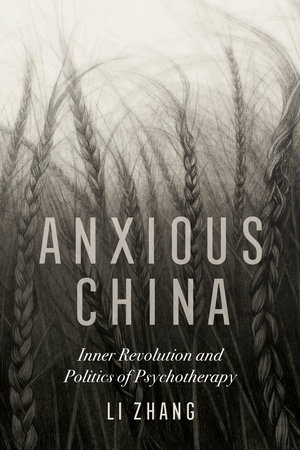By Li Zhang, author of Anxious China: Inner Revolution and Politics of Psychotherapy
This guest post is part of our #AAS2021 conference series. Visit our virtual exhibit to learn more.
The breathless pace of China’s economic reform has brought about deep ruptures in socioeconomic structures and people’s inner landscapes. Faced with relentless market-driven competition and profound social changes, more and more middle-class urbanites are turning to Western-style psychological counseling to grapple with their mental distress.
In my book Anxious China, I explore how an unfolding “inner revolution” is reconfiguring selfhood, psyche, family dynamics, sociality, and the mode of governing in post-socialist times. I show that anxiety—broadly construed in both medical and social terms—has become a powerful indicator for the general pulse of contemporary Chinese society. While grounded in the ethnographic specificities of middle-class Chinese urbanites, Anxious China seeks to offer powerful insights to scholars working on similar questions in diverse regions of the world.
At the same time, this book is also a deeply personal project for me due to my own unexpected encounter with anxiety attacks a few years ago following the passing of my mother in Kunming, and her long-term torment with undiagnosed mental distress. This unsettling personal and family experience helped me connect more deeply with the people who appear in my book, gaining insights and empathy for their suffering, desire, and struggle. I was no longer an emotionally detached researcher who was only interested in gathering data. I was someone who could feel their pain beyond words and was able to engage in intimate and heartfelt conversations. For this reason, I hope that my book can reach more readers on this emotional level beyond academic research.
As I write this, the world is deep in the frightening COVID-19 pandemic. Even though vaccines are on the way —a glimpse of hope—the widespread uncertainty and suffering caused by COVID-19 is unlikely to end soon. Meanwhile, the United States faced unprecedented political turmoil in the aftermath of violent Trump supporters storming Capitol Hill and assaulting democracy. In such turbulent and desolate times, it is not exaggerating to say that anxiety captures not only the mood of China but also the general state of being of the contemporary world at this moment. How to live through such an unsettling and difficult time? How to take care of our individual and collective well-being? How to find hope and resilience in the midst of political, economic, and public health crises? These questions become even more pressing for all of us to ponder and grapple with.
Since the publication of this book, I have done many virtual book talks nationally and internationally. It is gratifying to see how my research has sparked new questions, curiosity, debates, and creative interpretations among the readers. In particular, the COVID-19 pandemic has exposed how widespread anxiety and depression are in China and beyond. It emphasizes the urgent need for innovative social and therapeutic intervention. I hope that my book can help cultivate resilience and well-being by destigmatizing mental health issues and by showing how professional help is possible despite some of the pitfalls in this inner revolution. Finally, I hope to continue this highly productive conversation with more readers in the years to come, especially those interested in the Asian experience of psychological and mental health and its multiple social and political ramifications at a time of profound societal transformations.
